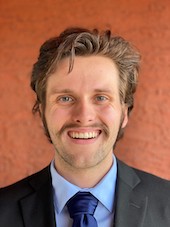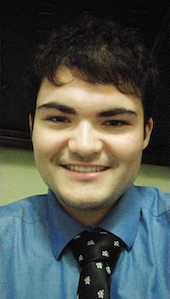Trainees
Welcome! We are actively recruiting new PhD students into UNT's G-RISE program. Please go to the "Apply" tab to apply, or contact any of the Oversight Committee Faculty.
2021 Cohort:
NIH Supported fellows:

Trevor Exley
Completed Ph.D. in Biomedical Engineering, May 2024
Trevor started at the University of North Texas in 2017 and has since received his B.S. and M.S. in biomedical engineering, and a focused minor in mechanical engineering. His research focus is in the fields of biomedical instrumentation, biomechanics, and machine learning. At the completion of his PhD, he hopes to obtain a post-doctoral position working with upper-limb prosthetics and transition to a faculty position at a university.
Mentor: Dr. Amir Jafari

Carlos Lopez
Completed Ph.D. in Behavior Analysis, August 2024
My name is Carlos Lopez and I am pursuing my doctoral degree in Health Sciences with a concentration in Behavior Analysis. I was born and raised in Dallas, Texas in a neighborhood known as Oak Cliff.
My love of Behavior Analysis began while taking an undergraduate introductory course here at UNT. The investigation between behavior and its environment allowed me to inch closer to a thorough understanding of why human and non-human behavior occurs. Ever since, I have looked at the world through a behavior analytic lens.
I am interested in research pertaining to all behavioral phenomena but more specifically, different aspects of social behavior. My research interests in social behavior are important to me because I truly believe that understanding the fundamental processes and mechanisms that exist during social interactions may aid researchers in creating social interventions designed to improve society's behavioral health issues.
I wish to pursue a career as a behavioral scientist for a health organization such as Centers for Disease Control and Prevention (CDC), World Health Organization (WHO), or National Institutes of Health (NIH). Such organizations will provide me the opportunity to make an effective impact on public health. I would like to contribute to the improvement of public health in the following three ways. First, by conducting research on social behavior that may contribute to public health issues. Second, by developing methods to analyze the behavioral processes contributing to societies' health issues. Third, by contributing to large scale behavioral interventions focused on improving public health issues such as mental illnesses, social skill deficits, and lack of prosocial behavior.
Mentor: Dr. April Becker

Maria Otero
Completed Ph.D. in Behavior Analysis, August 2024
My name is Maria Otero, and I am a first-year doctoral candidate in the health services research program with a concentration in behavior analysis. I was born in Colombia and Migrated to the United States at the age of five as a political refugee with my mother and older sister. Although assimilating to the United States was difficult for my family, my mother pushed us to pursue education to overcome poverty and language barriers. As a budding scientist-practitioner, my broad goals are to contribute to the development of technologies that allow clinicians and teachers to become more efficient and effective in their efforts to help children with learning difficulties.
I obtained my master's degree in behavior analysis from UNT in 2019. My master's thesis was translational work funded by the Cancer Prevention and Research Institute of Texas. It involved creating a technology that used a high definition, motion-detecting camera and custom-written software to teach children how to stay within clinically defined movement limits. The project's long-term goal was to avoid the use of general anesthesia to keep children still during radiotherapy protocols.
Throughout my undergraduate and graduate career, I also developed a prototype of an app (called READI) designed to quickly determine if a child had the pre-requisite skills needed to learn a complex verbal task. Technologies like this can help facilitate the creation of individualized interventions by increasing their effectiveness and reducing the frustrations often encountered because of inappropriately designed teaching programs. I am currently a board-certified behavior analyst at Cook Children's Hospital, where I provide early intensive behavioral interventions to children with autism spectrum disorder. In this context, I can see the potential utility of such technologies firsthand. My immediate goals throughout my doctoral journey are to further contribute to the development of READI in support of individualized interventions.
Mentor: Dr. Manish Vaidya
Kara Stuart
I am a Behavioral Science doctoral student in the Department of Psychology at UNT. I was born in California and moved to Texas, where I eventually got my bachelor's degree in Biology with minors in both Chemistry and Psychology from the University of North Texas. Presently, I work in the Cognitive Neuroscience lab under the guidance of Dr. Anthony Ryals. Specifically, I seek to expand my knowledge regarding the interface between the mind, brain, and body, and to investigate the promising effects of theory-guided applied interventions such as mindfulness-based interventions (MBI) and Eye-Movement Desensitization Reprocessing (EMDR) therapy. My hopes are that this research will help inform a web-based therapy tool which can offer intervention to women who have suffered PTSD from abusive relationships.
Mentor: Dr. Anthony Ryals
Institutionally Supported fellows:

Isamar Almeida
I am a Behavioral Science doctoral student in the Department of Psychology at UNT. I was born and raised in Venezuela, but I completed my education in Colombia. I received a bachelor's degree in Psychology from Universidad de la Sabana and a master's degree in Clinical Psychology from Fundacion Universitaria Konrad Lorenz. After I moved to the United States in 2019, I worked at a law firm interviewing immigrants who had been victims of domestic violence, human trafficking, or severe crimes. This experience led me to develop a profound interest in understanding the linkage between immigration and health. I am particularly interested in examining how stressful and traumatic experiences faced by immigrants affect their physical and mental health, as well as the effect of immigration policies on health outcomes such as stress levels, sleep, depression, anxiety, and disease risk. I am under the primary mentorship of Dr. Danica Slavish.
Mentor: Dr. Danica Slavish

Holden Paulette
I'm Holden Paulette, and I'm from Nacogdoches, TX. I graduated from SFASU with a B.S. in Physics, and I am here at UNT to continue that path with a PhD. I hope to finish graduate school by Spring 2026. My research background has been involved with Atomic Force Microscopy over an Alzheimer's project involving amyloid-beta. In the future, I'd like to also increase my proficiency at Python.
Mentor: Dr. Jingbiao Cui
2022 Cohort:
NIH Supported fellows:
Angello Huerta Gomez
Angello is a Ph.D. student in Biomedical Engineering.
Mentor: Dr. Huaxiao Adam Yang
Celeste Ortega-Rodriguez
Celeste is a Ph.D. student in Biology.
Mentor: Dr. Aaron Roberts
Nicholas Mercado
Nicholas is a Ph.D. student in Biochemistry and Molecular Biology.
Mentor: Dr. Lee Hughes
Steven Williams
Steven is a Ph.D. student in Biochemistry and Molecular Biology.
Mentor: Dr. Warren Burggren
2023 Cohort:
NIH Supported fellows:
Isabella Manuel
Isabella is a Ph.D. student in Clinical Psychology.
Mentor: Dr. Holly Levin-Aspenson
Mickaela Cook
Mickaela is a Ph.D. student in Biology.
Mentor: Dr. Amie Lund
Prynceston Fant
Prynceston is a Ph.D. student in Psychology.
Mentor: Dr. Sharon Jenkins
Joshua Martinez
Joshua is a Ph.D. student in Chemistry.
Mentor: Dr. Hong Wong
2024 Cohort:
NIH Supported fellows:
Michael Perlet
Michael is a Ph.D. student in Kinesiology.
Mentor: Dr. Joshua Keller
Daniel Johnson
Daniel is a Ph.D. student in Biomedical Engineering.
Mentor: Dr. Amir Jafari
Jennifer Nguyen
Jennifer is a Ph.D. student in Behavior Science.
Mentor: Dr. Daniele Ortu/Dr. April Becker
Anne Mack
Anne is a Ph.D. student in Psychology.
Mentor: Dr. Don Doughtery